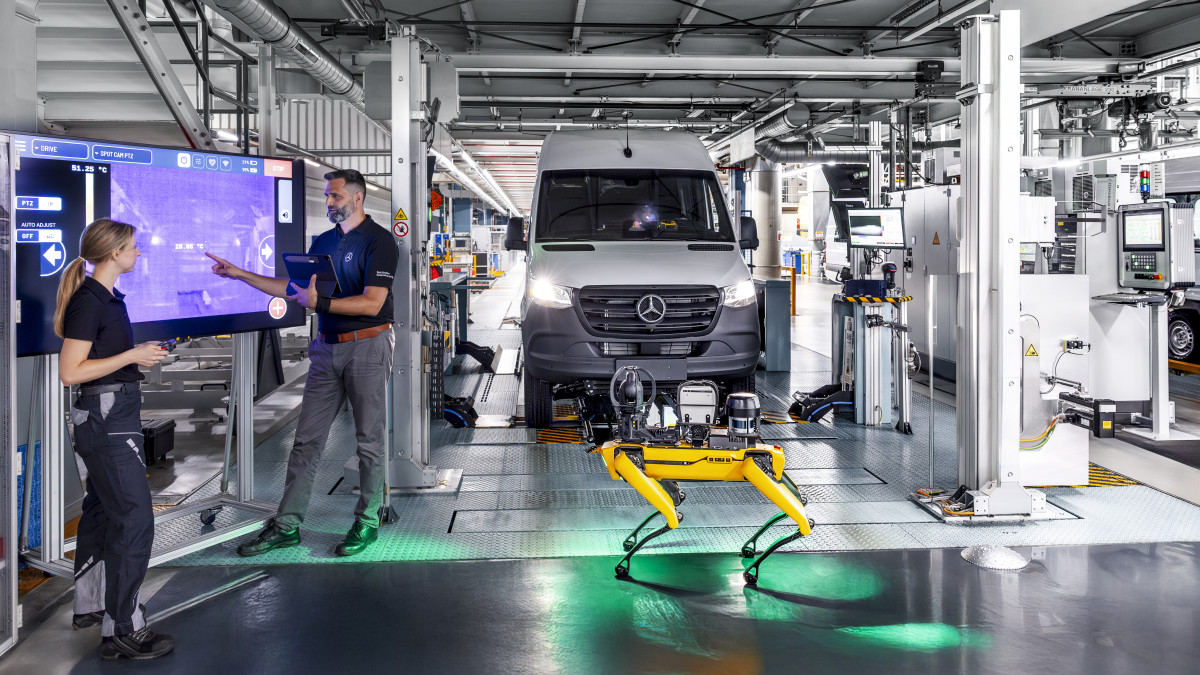Key Takeaways
- Mercedes-Benz employs a robotic dog named Aris to detect compressed air leaks at its Düsseldorf plant, saving significant energy costs.
- Aris can inspect gauges, log data, and adapt to various monitoring tasks, enhancing operational efficiency.
- Mercedes is integrating multiple robotic technologies, including drones for logistics, to streamline production and reduce monotonous tasks for workers.
Innovative Robotics at Mercedes-Benz
Robots are integral to modern automotive manufacturing, often represented by large arms performing welding and assembly tasks. However, Mercedes-Benz is embracing a new approach with its latest addition: Aris, a four-legged robotic dog stationed at the Sprinter van plant in Düsseldorf, Germany. Unlike traditional robots, Aris’s primary role is not assembly, but enhancing maintenance processes aimed at optimizing efficiency.
Aris is designed to detect compressed air leaks, a significant issue in energy-intensive environments like the sprawling 325,000 square meter Düsseldorf facility, employing 5,500 staff. Even minor leaks can lead to costly energy wastage, potentially tallying thousands of dollars annually. Equipped with advanced hearing and an acoustic imaging module, Aris can identify noise anomalies like hissing or buzzing sounds, transforming them into visual maps for easier detection. This proactive monitoring can prevent up to 60% of energy loss from leaks, translating into annual savings within the six-figure range.
In addition to leak detection, Aris is capable of inspecting analog gauges, collecting and logging data for future review, and navigating various areas of the factory. Its adaptability allows Aris to patrol stairs and check safety escape routes. Furthermore, Mercedes-Benz envisions future applications for Aris, such as developing a digital twin of the factory, providing a continuously updated 3D model of the workspace that engineers can use to streamline operations without halting production.
Aris is not Mercedes-Benz’s first venture into robotics. Earlier initiatives include collaborations with robotics firm Apptronik and trials of Apollo robots at the Berlin-Marienfelde factory, focusing on automating logistics and repetitive tasks. The Düsseldorf plant will also integrate drone technology to assist in counting empty containers, a duty currently performed by employees. This innovation enables workers to redirect their focus toward more complex tasks rather than unengaging routines.
Both Aris and the drones are designed with connectivity in mind, capable of interacting with cloud applications. This inter-connectivity allows for the potential integration of various robotic systems across Mercedes-Benz plants, creating an advanced ecosystem where digital coworkers collaborate seamlessly.
Mercedes-Benz’s pioneering spirit in factory robotics is part of a broader industry trend. Tesla is exploring its Optimus humanoid robots for both factory and customer use, while BMW has trialed humanoid robots to relieve employees from ergonomically challenging tasks. These technological advancements illustrate the industry’s shift toward integrating robots and artificial intelligence to enhance efficiency and potentially lower product costs, ushering in a new era in automotive manufacturing.
The content above is a summary. For more details, see the source article.















